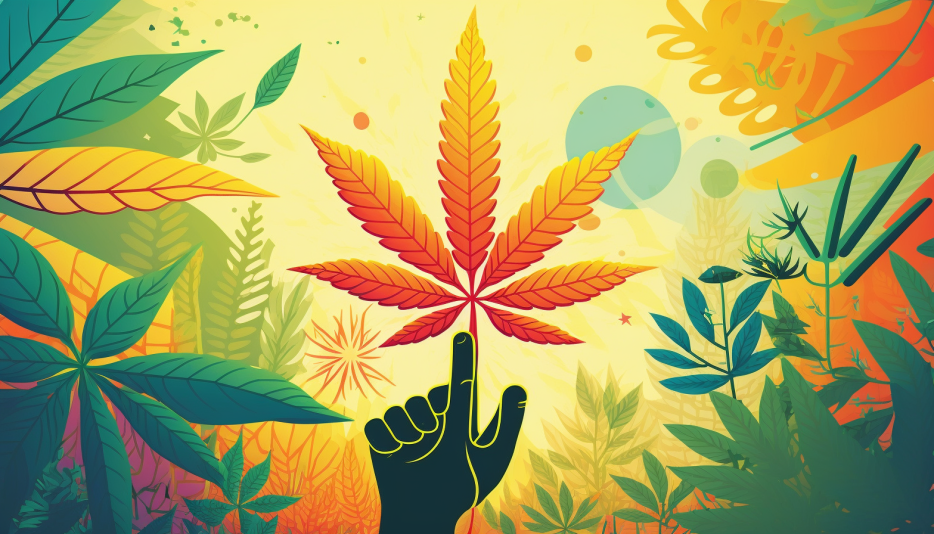Medical Marijuana for Anxiety: Unveiling its Potential for Effective Relief blog post
We will delve into the topic of medical marijuana for anxiety, exploring its benefits, effectiveness, and potential as a treatment option. By addressing the causes and symptoms of anxiety, as well as the limitations of traditional treatments, we will introduce the concept of medical marijuana and its components.
David Johnson
6/26/202318 min read


Medical marijuana for anxiety.
Exploring its benefits, effectiveness, and potential as a treatment option. By addressing the causes and symptoms of anxiety, as well as the limitations of traditional treatments, we will introduce the concept of medical marijuana and its components, THC and CBD. We will delve into the mechanisms through which medical marijuana interacts with the endocannabinoid system to alleviate anxiety symptoms. Additionally, we will discuss the benefits of medical marijuana for anxiety, including its potential neuroprotective properties. The blog post will also guide readers in selecting the right strain and dosage, and address safety considerations and potential side effects. Legal considerations and the availability of medical marijuana programs will also be covered, providing readers with a comprehensive understanding of the topic. Lastly, we will share real-life success stories of individuals who have found relief from anxiety through medical marijuana. By the end of the article, readers will have gained valuable insights into the potential of medical marijuana as a treatment for anxiety, empowering them to
FAQ’s
Is medical marijuana legal for anxiety treatment?
Answer: The legality of medical marijuana for anxiety treatment varies by country and region. It is important to research and understand the specific laws and regulations in your area before considering medical marijuana as a treatment option for anxiety.
How does medical marijuana alleviate anxiety?
Answer: Medical marijuana, particularly strains high in CBD, interacts with the endocannabinoid system in the body, modulating neurotransmitter activity and potentially reducing anxiety symptoms. CBD is believed to have anxiolytic properties, while THC may also provide anxiety relief at lower doses.
What are the potential side effects of medical marijuana for anxiety?
Answer: Common side effects of medical marijuana use include dry mouth, increased heart rate, red eyes, dizziness, and fatigue. Individual responses can vary, and it is important to be aware of personal sensitivity and adjust the dosage accordingly.
Can medical marijuana be used in conjunction with other anxiety medications?
Answer: Medical marijuana may interact with certain medications, such as CNS depressants or blood thinners. It is essential to consult with a healthcare professional to assess potential interactions and determine the most appropriate treatment plan for your specific circumstances.
How do I determine the right strain and dosage for my anxiety?
Answer: Finding the right strain and dosage of medical marijuana for anxiety is a personalized process. Factors to consider include THC-to-CBD ratio, personal sensitivity, terpene profiles, and previous experiences. It is advisable to work closely with healthcare professionals experienced in medical marijuana use to guide you in selecting the most suitable strain and dosage for your needs.
Unveiling the Potential of Medical Marijuana for Anxiety Relief
In recent years, there has been a growing interest in alternative treatment options for anxiety disorders. As anxiety continues to affect millions of individuals worldwide, it is crucial to explore potential therapies that can provide effective relief and improve the overall well-being of those struggling with this condition. One such emerging option is medical marijuana. This blog post aims to shed light on the effectiveness of medical marijuana as a potential treatment for anxiety, examining its benefits, mechanisms, and safety considerations.
Brief Explanation of Anxiety and Its Impact on Individuals
Anxiety is a complex mental health condition characterized by excessive worry, fear, and unease. It can manifest in various forms, such as generalized anxiety disorder (GAD), social anxiety disorder (SAD), panic disorder, and post-traumatic stress disorder (PTSD). The symptoms of anxiety can range from mild to debilitating, affecting individuals' daily lives, relationships, and overall quality of life.
Living with anxiety can be challenging, as it often leads to a persistent sense of apprehension, restlessness, and heightened physiological responses. Moreover, anxiety disorders can coexist with other mental health conditions, making diagnosis and treatment more complex.
Exploring the Effectiveness of Medical Marijuana as a Potential Treatment for Anxiety
Given the limitations and potential side effects of traditional anxiety treatments, the exploration of alternative therapeutic options is crucial. This blog post aims to delve into the world of medical marijuana and its potential as a treatment for anxiety. By examining the existing research, anecdotal evidence, and mechanisms of action, we will explore the effectiveness of medical marijuana in alleviating anxiety symptoms and enhancing the well-being of individuals living with anxiety disorders.
Understanding the potential benefits and limitations of medical marijuana for anxiety is essential for individuals seeking alternative treatments and for healthcare professionals considering it as an option. By shedding light on this topic, we aim to provide valuable insights that can empower individuals to make informed decisions about their anxiety management.
Understanding Anxiety: Causes, Symptoms, and Prevalence
Definition of Anxiety and its Classification
Anxiety is a normal and natural emotional response to stress or potential threats. It is a complex mental health condition characterized by feelings of fear, apprehension, and excessive worry. While occasional anxiety is a common part of life, anxiety disorders occur when these feelings become persistent, intense, and interfere with daily functioning.
Anxiety disorders can be classified into several types, including:
Generalized Anxiety Disorder (GAD): Individuals with GAD experience excessive and uncontrollable worry about various aspects of life, such as work, health, or everyday situations.
Social Anxiety Disorder (SAD): SAD is characterized by an intense fear of social situations and a persistent concern about being judged or humiliated by others.
Panic Disorder: Panic disorder involves recurrent and unexpected panic attacks, which are sudden periods of intense fear or discomfort accompanied by physical symptoms such as rapid heartbeat, shortness of breath, and dizziness.
Specific Phobias: Specific phobias involve an intense fear of a particular object, situation, or activity, such as heights, spiders, or flying.
Post-Traumatic Stress Disorder (PTSD): PTSD occurs after experiencing or witnessing a traumatic event, leading to intrusive memories, nightmares, and heightened anxiety.


Common Causes and Triggers of Anxiety Disorders
The development of anxiety disorders is influenced by a combination of genetic, environmental, and psychological factors. Some common causes and triggers include:
Genetics and Family History: Individuals with a family history of anxiety disorders may have a higher risk of developing anxiety themselves.
Traumatic Life Events: Experiencing traumatic events, such as abuse, accidents, or natural disasters, can contribute to the development of anxiety disorders.
Brain Chemistry and Imbalances: Imbalances in brain chemicals (neurotransmitters) such as serotonin, norepinephrine, and gamma-aminobutyric acid (GABA) are believed to play a role in anxiety disorders.
Chronic Medical Conditions: Certain chronic medical conditions, such as heart disease, diabetes, and respiratory disorders, can increase the risk of developing anxiety disorders.
Substance Abuse: Alcohol or drug abuse can contribute to the development or exacerbation of anxiety disorders.
Symptoms Associated with Anxiety
The symptoms of anxiety can vary in intensity and duration, depending on the individual and the specific type of anxiety disorder. Common symptoms include:
Excessive Worry and Fear: Individuals with anxiety disorders often experience persistent and irrational worry or fear about everyday situations or specific triggers.
Restlessness and Irritability: Anxiety can lead to feelings of restlessness, irritability, and difficulty concentrating.
Physical Symptoms: Anxiety often manifests with physical symptoms such as increased heart rate, sweating, trembling, shortness of breath, headaches, and gastrointestinal distress.
Sleep Disturbances: Many individuals with anxiety disorders experience difficulties falling asleep or staying asleep due to racing thoughts or restlessness.
Avoidance Behaviors: Some individuals may engage in avoidance behaviors to prevent situations or triggers that cause anxiety, which can impact their daily lives and relationships.
Statistics Highlighting the Prevalence of Anxiety Disorders
Anxiety disorders are among the most common mental health conditions worldwide. According to the World Health Organization (WHO), approximately 284 million people worldwide have an anxiety disorder, making it the most prevalent mental health condition globally. In the United States, anxiety disorders affect around 31% of adults at some point in their lives, according to the National Institute of Mental Health (NIMH). Furthermore, anxiety disorders often coexist with other mental health conditions, such as depression and substance abuse disorders.
These statistics highlight the significant impact of anxiety disorders on individuals and society as a whole. They emphasize the need for effective treatment options that can alleviate the burden of anxiety and improve the overall well-being of those affected.
Understanding the causes, triggers, and symptoms of anxiety disorders is crucial for early detection, accurate diagnosis, and appropriate treatment planning. By recognizing the signs and symptoms of anxiety, individuals and healthcare professionals can work together to develop effective strategies for managing and treating this condition.
Anxiety disorders are highly treatable, and individuals should not suffer in silence. Seeking professional help from mental health professionals, such as therapists, psychiatrists, or counselors, can provide the necessary support and guidance for overcoming anxiety.
We will explore the potential of medical marijuana as a treatment option for anxiety disorders. By examining its mechanisms of action, benefits, and safety considerations, we aim to provide valuable insights that can assist individuals in making informed decisions about their anxiety management.
Traditional Treatment Options for Anxiety
Medications Commonly Prescribed for Anxiety Management
When it comes to managing anxiety disorders, healthcare professionals often employ medications as part of the treatment plan. Some commonly prescribed medications for anxiety include:
Selective Serotonin Reuptake Inhibitors (SSRIs): SSRIs, such as sertraline (Zoloft) and escitalopram (Lexapro), are commonly used antidepressants that can also be effective in treating anxiety disorders. They work by increasing the levels of serotonin, a neurotransmitter associated with mood regulation, in the brain.
Benzodiazepines: Benzodiazepines, such as alprazolam (Xanax) and diazepam (Valium), are sedative medications that provide short-term relief from anxiety symptoms. They work by enhancing the effects of gamma-aminobutyric acid (GABA), a neurotransmitter that promotes relaxation and reduces anxiety.
Buspirone: Buspirone (Buspar) is an anti-anxiety medication that acts as a serotonin receptor agonist. It is often used for generalized anxiety disorder and does not carry the same risk of dependence as benzodiazepines.
Beta-Blockers: Beta-blockers, such as propranolol (Inderal), are primarily used to manage physical symptoms of anxiety, such as rapid heartbeat and trembling. They work by blocking the effects of adrenaline, reducing the body's physiological response to anxiety.


Psychotherapy and Counseling Techniques Utilized in Anxiety Treatment
Psychotherapy, also known as talk therapy, is a widely recognized and effective treatment approach for anxiety disorders. Some commonly utilized techniques include:
Cognitive-Behavioral Therapy (CBT): CBT helps individuals identify and modify negative thought patterns and behaviors associated with anxiety. It involves practical strategies, such as cognitive restructuring and exposure therapy, to reduce anxiety symptoms and improve coping skills.
Acceptance and Commitment Therapy (ACT): ACT focuses on accepting anxious thoughts and feelings without judgment while committing to actions aligned with personal values. It emphasizes mindfulness techniques and encourages individuals to take steps toward a meaningful life despite anxiety.
Dialectical Behavior Therapy (DBT): DBT combines elements of CBT with mindfulness and acceptance strategies. It helps individuals regulate their emotions, improve interpersonal skills, and develop effective coping mechanisms for anxiety.
Psychodynamic Therapy: Psychodynamic therapy explores the underlying unconscious processes and early life experiences contributing to anxiety. It aims to bring awareness to unresolved conflicts and develop healthier ways of managing anxiety.
Limitations and Potential Side Effects of Traditional Treatments
While traditional treatments for anxiety disorders can be effective, they may also have limitations and potential side effects to consider:
Medication Side Effects: Common side effects of anxiety medications may include drowsiness, dizziness, nausea, and sexual dysfunction. Benzodiazepines, in particular, carry a risk of dependence and withdrawal symptoms with long-term use.
Incomplete Symptom Relief: Some individuals may not experience complete relief from their anxiety symptoms with medication alone. Additional therapy or lifestyle changes may be necessary for comprehensive management.
Individual Variability: Different individuals may respond differently to medications or therapeutic approaches. It may take time to find the most suitable treatment that works best for each person.
Lack of Addressing Underlying Causes: While traditional treatments focus on symptom management, they may not address the root causes or underlying psychological factors contributing to anxiety.
Reliance on Long-Term Medication: Some individuals may prefer non-pharmacological approaches or seek alternatives due to concerns about long-term medication use or potential side effects.
Definition and Explanation of Medical Marijuana
Medical marijuana, also known as medical cannabis, refers to the use of the cannabis plant or its extracts for medicinal purposes. It involves the utilization of specific strains and preparations of the cannabis plant that are believed to possess therapeutic properties for various medical conditions, including anxiety.
Marijuana contains numerous chemical compounds known as cannabinoids, which interact with the body's endocannabinoid system to produce various effects. The two most well-known cannabinoids found in marijuana are tetrahydrocannabinol (THC) and cannabidiol (CBD). These compounds are believed to play a significant role in the potential therapeutic benefits of medical marijuana.
Components of Medical Marijuana: THC and CBD
Tetrahydrocannabinol (THC): THC is the primary psychoactive compound found in marijuana. It is responsible for the euphoric "high" often associated with recreational marijuana use. However, in medical marijuana, THC is utilized for its potential therapeutic effects, such as pain relief, relaxation, and mood modulation.
Cannabidiol (CBD): CBD is another important cannabinoid found in marijuana. Unlike THC, CBD is non-psychoactive, meaning it does not produce the intoxicating effects associated with THC. CBD is believed to have various potential therapeutic properties, including anti-inflammatory, analgesic, and anxiolytic (anxiety-reducing) effects.
The ratio of THC to CBD in medical marijuana strains can vary, and different ratios may be recommended for different conditions or symptoms. The balance between these two cannabinoids, along with other compounds present in the plant, is thought to contribute to the overall therapeutic effects of medical marijuana.
Legal Status of Medical Marijuana Worldwide
The legal status of medical marijuana varies across different countries and regions. While some countries have legalized medical marijuana and established specific regulations for its use, others may have partial legalization or restrict its use entirely.
As of my knowledge cutoff in September 2021, several countries have legalized medical marijuana to varying degrees, including Canada, certain states in the United States, Germany, Israel, Australia, and the Netherlands, among others. However, it is important to note that laws and regulations are subject to change, and new developments in medical marijuana legislation may have occurred since then.
Before considering medical marijuana as a treatment option, it is essential for individuals to thoroughly research and understand the legal framework and requirements in their specific jurisdiction. This may involve obtaining a medical marijuana card or authorization from a healthcare professional and adhering to specific guidelines and regulations.
Mechanisms of Medical Marijuana for Anxiety Relief
How Cannabinoids Interact with the Endocannabinoid System
The human body has an endocannabinoid system (ECS), which plays a crucial role in regulating various physiological processes, including mood, stress response, and anxiety. The ECS consists of cannabinoid receptors (CB1 and CB2) and endocannabinoids (cannabinoids produced naturally in the body). When cannabinoids from medical marijuana are introduced into the body, they interact with these receptors and modulate the ECS.
Cannabinoids, such as THC and CBD, can bind to CB1 and CB2 receptors in the brain and peripheral tissues. CB1 receptors are primarily found in the central nervous system, while CB2 receptors are mainly located in immune cells. By binding to these receptors, cannabinoids can influence neurotransmitter release, reduce neuronal excitability, and modulate the overall functioning of the ECS.
Role of THC and CBD in Anxiety Management
Tetrahydrocannabinol (THC): THC has been shown to have anxiolytic (anti-anxiety) effects by interacting with CB1 receptors in the brain. It activates these receptors, leading to the release of neurotransmitters that regulate mood, such as serotonin and dopamine. By modulating the activity of these neurotransmitters, THC may help reduce anxiety symptoms and promote relaxation.
However, it is important to note that higher doses of THC or THC-dominant strains may potentially increase anxiety in some individuals, particularly those who are sensitive to its psychoactive effects. Finding the right balance and individualized approach is crucial when considering THC as a treatment option for anxiety.
Cannabidiol (CBD): CBD has gained attention for its potential anxiolytic properties without the psychoactive effects associated with THC. CBD interacts with various receptors and ion channels in the brain, including serotonin receptors (5-HT1A), which are involved in regulating mood and anxiety.
CBD is believed to modulate serotonin levels, which may help alleviate anxiety symptoms. It also influences the GABA system, which plays a crucial role in anxiety regulation. By enhancing GABAergic neurotransmission, CBD can promote a calming effect and reduce anxiety levels.
Research Studies Supporting the Use of Medical Marijuana for Anxiety
Several research studies have explored the potential of medical marijuana, particularly CBD-rich strains, in managing anxiety disorders. While research is still ongoing and more studies are needed, preliminary evidence suggests promising results:
A 2019 study published in The Permanente Journal found that CBD oil significantly reduced anxiety levels in participants with sleep and anxiety-related disorders.
A 2015 review published in Neurotherapeutics suggested that CBD may have potential therapeutic effects for multiple anxiety disorders, including generalized anxiety disorder (GAD), social anxiety disorder (SAD), and post-traumatic stress disorder (PTSD).
A 2019 review published in Current Neuropharmacology indicated that THC may have anxiolytic effects, especially at low doses, and can modulate fear-related memories associated with anxiety disorders.
Benefits of Medical Marijuana for Anxiety
Reduction of Anxiety Symptoms: Evidence from Studies and Patient Testimonials
Medical marijuana has shown promise in reducing anxiety symptoms in various studies and has received positive feedback from individuals who have used it for anxiety management. Some key points to consider include:
Anxiolytic Effects: Cannabinoids, such as THC and CBD, have demonstrated anxiolytic properties by interacting with the endocannabinoid system and modulating neurotransmitter activity. This can result in a reduction of anxiety symptoms, including excessive worry, restlessness, and physical manifestations of anxiety.
Sleep Improvement: Medical marijuana has been reported to help individuals with anxiety-related sleep disturbances. By promoting relaxation and reducing anxiety levels, it may enhance sleep quality and duration, leading to overall improvement in well-being.
Social Anxiety Relief: Research suggests that medical marijuana may help alleviate symptoms of social anxiety disorder (SAD), allowing individuals to feel more at ease in social situations. It can potentially reduce self-consciousness, fear of judgment, and social avoidance behaviors.
While individual responses to medical marijuana can vary, the positive experiences shared by some individuals with anxiety disorders highlight its potential as an alternative treatment option.
Non-Addictive Nature of Medical Marijuana Compared to Traditional Medications
One significant advantage of medical marijuana over traditional anxiety medications, such as benzodiazepines, is its non-addictive nature. Benzodiazepines can carry a risk of dependence and withdrawal symptoms with long-term use, leading to potential substance abuse issues. In contrast, medical marijuana, when used responsibly and under medical supervision, has shown a lower risk of addiction.
Potential Neuroprotective Properties of Medical Marijuana
Emerging research suggests that medical marijuana may possess neuroprotective properties that could be beneficial for individuals with anxiety disorders. Some key findings include:
Anti-Inflammatory Effects: Chronic inflammation in the brain has been linked to anxiety and other mental health disorders. Cannabinoids, especially CBD, have shown anti-inflammatory effects, which may help reduce neuroinflammation and potentially alleviate anxiety symptoms.
Neurogenesis and Neuroplasticity: Preclinical studies have suggested that cannabinoids, particularly CBD, may promote neurogenesis (the growth of new neurons) and enhance neuroplasticity (the brain's ability to adapt and change). These mechanisms are important for overall brain health and may contribute to improved mood and anxiety regulation.
It is important to note that further research is needed to fully understand the neuroprotective effects of medical marijuana and its specific implications for anxiety treatment. However, these preliminary findings indicate the potential therapeutic benefits beyond symptom relief.
Choosing the Right Strain and Dosage for Anxiety
Overview of Different Strains and Their Effects on Anxiety
When considering medical marijuana for anxiety management, it's important to understand that different strains can have varying effects. Here are some commonly encountered strains and their potential impact on anxiety:
Indica Strains: Indica strains are generally associated with relaxation and sedation. They may help reduce anxiety symptoms by promoting a calming and soothing effect on both the mind and body. Indica strains are often preferred for nighttime use due to their potential to induce sleepiness.
Sativa Strains: Sativa strains are known for their energizing and uplifting effects. While some individuals may find sativa strains helpful for boosting mood and focus, they can sometimes exacerbate anxiety symptoms due to their potential to increase mental stimulation and racing thoughts. Sativa strains are generally recommended for daytime use or when a mood lift is desired.
Hybrid Strains: Hybrid strains are a combination of indica and sativa genetics, resulting in varying ratios of their effects. These strains can offer a more balanced experience, combining relaxation and mental stimulation. Hybrid strains with higher CBD content may be preferable for anxiety management due to their potential anxiolytic properties.
It's important to note that individual responses can differ, and what works for one person may not work for another. Experimentation with different strains under medical supervision can help identify the most suitable option for anxiety relief.
Factors to Consider When Selecting a Strain for Anxiety Management
When selecting a strain for anxiety management, several factors should be taken into account:
THC-to-CBD Ratio: Strains with higher CBD content and lower THC content are often recommended for anxiety management. CBD has shown potential anxiolytic effects, while higher THC levels may increase the risk of anxiety in some individuals. Finding the right balance of THC and CBD is crucial to minimize potential anxiety-inducing effects.
Sensitivity to THC: Individuals with heightened sensitivity to THC or those prone to anxiety may opt for strains with lower THC levels or CBD-dominant strains. Starting with a low THC concentration and gradually increasing the dosage can help gauge individual tolerance and minimize the risk of anxiety-related side effects.
Terpene Profile: Terpenes are aromatic compounds found in cannabis that contribute to its unique scent and potential effects. Some terpenes, such as myrcene and linalool, have calming and relaxing properties. Strains with a higher presence of these terpenes may be beneficial for anxiety relief.
Personal Preference and Experience: Each individual's response to different strains can vary, and personal preference plays a significant role in selecting an appropriate strain. It's important to communicate openly with healthcare professionals and consider previous experiences to find strains that provide the desired effects and minimize anxiety symptoms.


Dosage Guidelines and Recommendations for Medical Marijuana Use
Determining the right dosage of medical marijuana for anxiety requires an individualized approach. Factors that influence the appropriate dosage include:
Body Weight and Metabolism: Individuals with higher body weight or faster metabolism may require higher doses to achieve the desired effects.
Tolerance and Sensitivity: Regular use of medical marijuana may result in increased tolerance, necessitating adjustments to the dosage. Sensitivity to cannabinoids should also be considered to avoid adverse effects.
Method of Consumption: Different methods of consumption, such as smoking, vaporizing, or using edibles, can affect the absorption and bioavailability of cannabinoids. Each method has its own onset time and duration, influencing the dosage timing and frequency.
Starting with a low dose and gradually titrating upward while closely monitoring the effects is generally recommended. This allows individuals to find the optimal dosage that provides anxiety relief without unwanted side effects.
Safety and Side Effects of Medical Marijuana
Overview of Common Side Effects Associated with Medical Marijuana Use
Like any medication, medical marijuana can have side effects, although they tend to be mild and well-tolerated by most individuals. It's important to be aware of these potential side effects, which may include:
Dry Mouth: Also known as "cottonmouth," dry mouth is a common side effect of medical marijuana use. It can be alleviated by staying hydrated and using oral moisturizing products.
Increased Heart Rate: Medical marijuana, particularly strains with higher THC content, may temporarily increase heart rate. This effect is typically short-lived and may not pose significant risks for healthy individuals. However, individuals with pre-existing cardiovascular conditions should exercise caution.
Red Eyes: The consumption of medical marijuana can cause blood vessels in the eyes to dilate, resulting in red or bloodshot eyes. This effect is temporary and not usually a cause for concern.
Dizziness and Lightheadedness: Some individuals may experience temporary dizziness or lightheadedness after using medical marijuana, especially when using strains with higher THC concentrations. It is recommended to avoid activities that require alertness until these effects subside.
Fatigue and Drowsiness: Certain strains of medical marijuana, particularly indica strains, can induce relaxation and sedation, leading to feelings of fatigue or drowsiness. This effect may be desirable for individuals experiencing sleep disturbances associated with anxiety but should be taken into consideration when engaging in activities that require attention and concentration.
Precautions and Potential Risks to Consider
While medical marijuana is generally considered safe, it is important to exercise caution and consider potential risks:
Psychoactive Effects: The psychoactive effects of THC can vary among individuals. Some individuals may experience heightened anxiety or paranoia, especially at higher doses or when using strains with higher THC content. It is advisable to start with low doses and gradually increase as tolerated.
Impaired Cognitive Function: Marijuana use, particularly when using strains high in THC, may temporarily impair cognitive function, including memory, attention, and decision-making. It is recommended to avoid activities that require mental acuity, such as driving or operating machinery, until the effects have subsided.
Respiratory Risks: Smoking marijuana can pose risks to respiratory health, similar to tobacco smoke. Individuals concerned about potential respiratory effects may opt for alternative methods of consumption, such as vaporizers or edibles.
Individual Sensitivity: Each person may respond differently to medical marijuana, and some individuals may be more sensitive to its effects. It is important to be aware of personal tolerance and adjust dosage accordingly.
Interactions with Other Medications and Substances
Medical marijuana may interact with certain medications, including but not limited to:
Central Nervous System (CNS) Depressants: Combining medical marijuana with sedatives, tranquilizers, or alcohol can enhance the sedative effects and increase the risk of excessive sedation or respiratory depression.
Blood Thinners: Medical marijuana may interact with anticoagulant medications, potentially affecting their efficacy or increasing the risk of bleeding. Individuals taking blood thinners should consult with their healthcare provider before using medical marijuana.
Cytochrome P450 (CYP450) Enzyme Interactions: Some cannabinoids in medical marijuana can interact with enzymes responsible for metabolizing certain medications, potentially altering their effectiveness or concentration in the body. It is important to discuss potential interactions with a healthcare professional, especially for individuals taking multiple medications.
Conclusion
Potential Benefits and Effectiveness of Medical Marijuana for Anxiety
In conclusion, medical marijuana shows potential as a treatment option for anxiety disorders. It offers several benefits, including the reduction of anxiety symptoms, potential non-addictive nature compared to traditional medications, and potential neuroprotective properties. Research studies and patient testimonials suggest that medical marijuana, particularly strains with higher CBD content, can help alleviate anxiety and improve overall well-being.
Encouraging Further Research and Discussion on the Topic
While medical marijuana shows promise, it is important to continue conducting rigorous research to better understand its mechanisms of action, optimal dosages, and long-term safety. Additionally, fostering open discussions among healthcare professionals, patients, and policymakers is crucial to ensure evidence-based decision-making and to address any concerns or questions regarding the use of medical marijuana for anxiety.
The Future of Medical Marijuana as an Anxiety Treatment Option
The future of medical marijuana as an anxiety treatment option looks promising. As more research emerges and regulations evolve, individuals with anxiety disorders may have increased access to medical marijuana as a viable therapeutic option. However, it is essential to approach its use with caution, seeking guidance from healthcare professionals and understanding the individualized nature of treatment.
Individual responses to medical marijuana can vary, and what works for one person may not work for another. Finding the right strain, dosage, and method of consumption is a process that should be personalized to each individual's needs and preferences.
The landscape of medical marijuana continues to evolve, it is vital to balance the potential benefits with the considerations and potential risks associated with its use. Responsible use, informed decision-making, and ongoing dialogue between patients and healthcare professionals will shape the future of medical marijuana as an anxiety treatment option.
Medical marijuana holds promise for individuals seeking alternative treatments for anxiety disorders. Its potential benefits, such as anxiety symptom reduction, non-addictive nature, and potential neuroprotective properties, make it an intriguing option. However, further research, open discussions, and personalized approaches are necessary to ensure safe and effective use in the management of anxiety.






